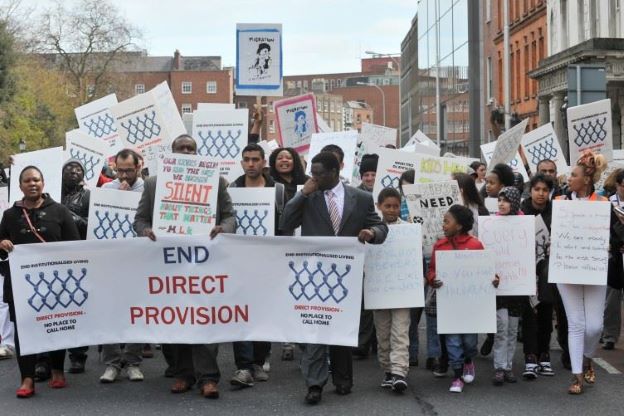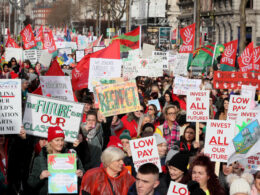By Katia Hancke and Monika Janas
Direct provision centres across Ireland are coming more into the limelight for the continuing exclusion and poverty they force upon some of the most vulnerable residents on this island.
When asylum seekers – children, women and men who have to flee their homes and families and make the hazardous and often outright dangerous journey across the globe – arrive in this state, their ordeal is far from over. Rather than being given the opportunity to rebuild their lives, they are isolated from society and stuck in “direct provision” centres.
They are not allowed to work, have to live under the restrictive regime of the centre (e.g. meals are served at set times three times per day only) and have to make do with €19.10 per week. They have to remain in this situation until their case is finished – the majority of people stay in direct provision for around 3 years, some live in these conditions for seven years or more. They are at the mercy of the state to be moved from centre to centre.
While nominally run by the state, in reality these centres are privatised – “outsourced” to catering and management companies who run them for private profit. No wonder then that the conditions in them are deplorable – serious issues about lack of sanitation, lack of food, lack of privacy, lack of basic amenities are rampant across the system. Asylum seekers in different centres have tried to bring these abuses into the open and have in desperation turned to tactics such as hunger strikes to highlight their plight.
More fundamentally, the system of direct provision is an inhumane way to deal with asylum seekers and in contravention of EU directives. The European Anti-Poverty Network sums up the effects of prolonged residence in the Direct Provision system as follows:
“This system directly creates poverty and social exclusion as well as isolation and widespread depression and mental illness. The explicit exclusion of asylum seekers from integration policies stores up social problems for the future.”
We live in a period in history where war and conflict are a more permanent feature affecting a huge proportion of the world population as never before. The responsibility of western governments and multinationals for this situation is bigger than ever.
Millions of people are displaced from their homes because of this, the few thousand who make it onto Irish shores should be guaranteed the opportunity to rebuild their lives and the right to asylum. This includes giving all migrants the right to health care, education, to work, to a home and to the same stability and security we all deserve.
615 points: but still no college place
With €19 a week, living in awful conditions, asylum seekers in direct provision are one of the most impoverished groups in Ireland.
The biggest victims of this atrocious treatment are young people. There are over 1,600 children in direct provision waiting for their applications to be processed, some of them without their parents or family. Forced to live in places that are meant to be temporary, like hotel and motel rooms, often having to share a bathroom with strangers, no one should be subjected to that kind of treatment but especially not children in the midst of their development. Young people cannot grow up in these conditions; it is bad for their mental and physical health.
An example of the hardship of young asylum seekers in Ireland is the case of Nadia Prochukham (18). After getting 615 points in her Leaving Certificate and successfully applying to Trinity College, she is faced with a huge €15,000 in tuition fees on the basis that she is an asylum seeker.
Instead of helping and protecting, the government is destroying these people’s lives.












